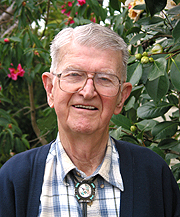|
March 8, 2004
Social psychologist Brewster Smith urges an activist
approach
By Jennifer McNulty
Fifty years after contributing to the U.S. Supreme Court case that
banned school segregation, social psychologist M. Brewster Smith is
calling on colleagues to engage in work that contributes to human betterment.
|

In the early 1950s, Brewster Smith testified against school segregation
as an expert witness in a case before a federal appeals court
that was one of four lower court cases on which the Supreme Court
based its Brown decision.
|
Smith, a professor emeritus of psychology at UCSC, was one of the psychologists
whose work informed the court’s landmark ruling in the Brown
v. Board of Education case. He laments the fact that professional
pressures and research incentives discourage today’s scholars from
engaging in action-oriented work.
“The focus on scientific rigor has come at the cost of breadth,”
said Smith, author of the new book For a Significant Social Psychology:
Collected Writings of M. Brewster Smith (New York: New York University
Press, 2003).
The book is a collection of essays and new commentary about social
psychology that touches on topics as diverse as prejudice, McCarthyism,
and the Bush administration’s “war on terrorism.”
In calling for research that addresses contemporary social issues and
advocacy based on psychological analysis, Smith hopes to stimulate intergenerational
dialogue and to counter what he calls the “somewhat stultifying”
professional climate in the field of social psychology today.
At 84, Smith has earned the title of elder statesman in the field of
social psychology, though he has served in that capacity throughout
much of his career, as a commentator, editor, and leader of influential
organizations such as the American Psychological Association (APA).
He will participate on a Brown v. Board of Education anniversary
panel at the APA’s annual meeting in July.
In the early 1950s, Smith testified against school segregation as an
expert witness in a case before a Richmond, Virginia, federal appeals
court that was one of four lower court cases on which the Supreme Court
based its Brown decision. Throughout his career, Smith explored
the intersections of society and human personality, making lasting contributions
to the understanding of how political opinions relate to personality
and the psychology of combat soldiers, among other areas.
When Smith entered the emerging field of social psychology some 60
years ago, the field held the promise of integrating scientific excellence
and human values, but it has become more narrow and specialized over
time until, said Smith, researchers today find themselves “muscle-bound”
by the “hard-nosed scientific focus.” The tenure-driven push
for frequent publication in refereed journals discourages investment
in longer-term research endeavors that don’t pay off with quick
results, he said.
Yet the need for interdisciplinary approaches is more urgent than ever,
said Smith, as the global gap between “haves” and “have
nots” widens, hopelessness spreads, and the United States exercises
its power unilaterally in the post-9/11 world. The division between
the United States and underdeveloped Islamic nations is being fueled
by the Bush administration’s policies, said Smith.
“Obviously, if people are deprived, powerless, and hopeless, they
become more likely to want to seek their salvation in the other world
by doing things like suicide bombing,” said Smith. “We can’t
stamp out terrorism as long as we’re the big, wealthy, comfortable
power. We should be taking collective action, preferably through the
United Nations, rather than taking on the burden of being the policeman
of the world. We need to reduce the enormous gulf between us and the
rest of the world.” Understanding the psychological components
of international relations should be a high priority, said Smith, who
is heartened by increasing cooperation with social scientists in the
developing world.
“I distrust Bush greatly because he deliberately gets us into
real wars--and his metaphorical war on terrorism--as a way of inducing
more and more people to behave like sheep,” said Smith. “Creating
this sense of emergency makes people more likely to turn to charismatic
leaders. It’s important to resist and not go along, because if
the courageous minority speaks up and is visible, it can have an important
influence on the rest of the people.”
Return to Front Page
|